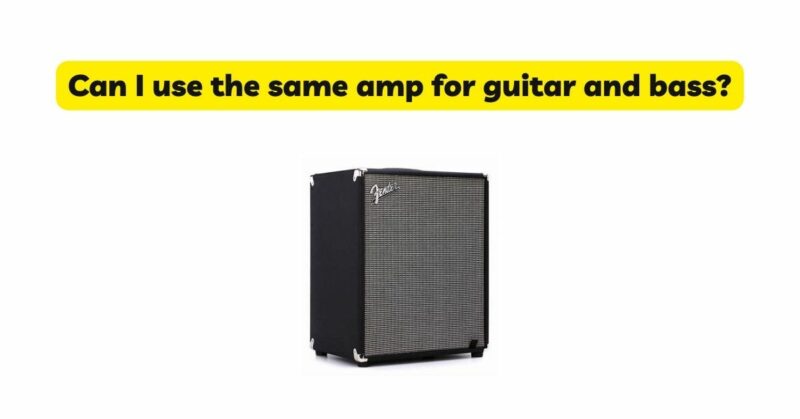As a multi-instrumentalist or someone with limited resources, you may find yourself wondering if it’s possible to use the same amplifier for both guitar and bass. While it is technically feasible to connect both instruments to a single amp, there are important considerations to keep in mind. In this article, we will explore the compatibility between guitar and bass with the same amplifier, discuss the advantages and limitations, and provide insights to help you make an informed decision.
Understanding the Differences: Guitars and bass guitars have unique characteristics that set them apart. Guitars are typically tuned higher, have thinner strings, and produce a wide range of melodic and harmonic tones. Bass guitars, on the other hand, are designed to produce lower frequencies and provide the foundation for the rhythm section. They have thicker strings and longer scales to accommodate the lower register.
Compatibility Considerations: When deciding to use the same amplifier for guitar and bass, it’s essential to consider the following factors:
- Frequency Response and EQ: Amplifiers are often tailored to the specific frequency range of the instrument they are designed for. Guitar amplifiers are optimized for mid to high frequencies, while bass amplifiers are designed to handle lower frequencies. Using a guitar amplifier for bass can result in a loss of low-end response, making the bass sound thin and lacking depth. Additionally, the EQ settings on the amplifier may not be suitable for optimizing the tone of both instruments simultaneously.
- Power Handling: Bass guitars produce more low-frequency energy, requiring more power to accurately reproduce the sound. Bass amplifiers are generally designed with higher wattage ratings to accommodate this requirement. Using a guitar amplifier for bass may push the amp beyond its power limits, leading to distortion, speaker damage, or even potential damage to the amplifier components.
- Speaker Considerations: The speaker configuration of an amplifier plays a crucial role in sound reproduction. Guitar speakers are often designed to emphasize mid-range frequencies and provide a specific tonal character. Bass speakers, on the other hand, are built to handle low frequencies and deliver a tighter and more pronounced low-end response. Using a guitar amp with bass may result in the speakers struggling to reproduce the low frequencies accurately, resulting in a compromised bass tone.
Advantages and Limitations:
- Cost and Convenience: Using the same amplifier for both guitar and bass can be cost-effective and convenient, especially if you have a limited budget or limited space for multiple amplifiers. It eliminates the need to invest in separate equipment and simplifies your setup.
- Tonal Compromises: While using a single amp for both instruments offers convenience, it also comes with tonal compromises. The limitations in frequency response and speaker configuration may result in a less than ideal sound for either the guitar or bass. You may have to make EQ adjustments and compromise on the desired tonal characteristics of each instrument.
- Playing Styles and Genres: Consider the style of music you predominantly play. If you primarily play genres that require a distinct and specialized bass tone, such as funk or heavy rock, using a dedicated bass amp is highly recommended. However, if you’re playing genres that allow for more flexibility and tonal experimentation, such as indie or folk, using the same amp for guitar and bass may yield acceptable results.
Mitigating the Limitations: If you decide to use the same amplifier for guitar and bass, here are some tips to mitigate the limitations:
- EQ Adjustments: Experiment with the EQ settings on the amplifier to find a balance that works well for both instruments. Focus on optimizing the mid-range frequencies for the guitar while adjusting the bass and treble to enhance the bass guitar’s low-end response.
- Pedals and Effects: Consider using pedals and effects to shape the tone of each instrument. Utilize overdrive or distortion pedals to add grit and sustain to the guitar’s sound, while compression and modulation effects can enhance the bass guitar’s presence and definition.
- External Cabinets: If your amplifier allows for it, consider connecting external cabinets specifically designed for bass to enhance the low-frequency response. This can help compensate for the limitations of guitar speakers and provide a more satisfying bass tone.
Conclusion: Using the same amplifier for both guitar and bass is possible, but it comes with certain limitations and compromises. While it may be a cost-effective and convenient solution, be aware that the tonal characteristics and frequency responses of the instruments may not be fully optimized. If you are serious about achieving the best sound quality and maintaining the integrity of each instrument, it is recommended to invest in dedicated amplifiers for guitar and bass. Ultimately, the choice depends on your musical preferences, playing style, and budget constraints.

